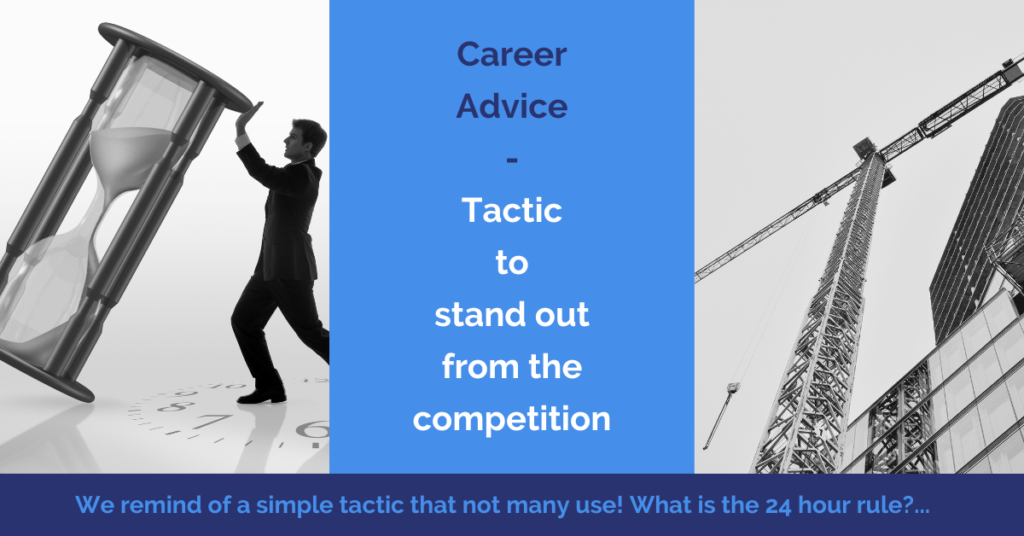We’ve all heard the expression that it’s the little things that make the biggest difference. And we are definitely of the mind that from little things, big things grow. So, we thought we’d highlight a simple tactic that can make you stand out from the competition – keeping the momentum going with quick communications and the 24 hour rule. It may sound small, but you’d be surprised how many people do not respond in a timely manner.

The scenario
You’ve applied for a job, the company has read your resume and expressed interest in meeting. Yet many people prioritise their day-to-day work first, putting career opportunities second by not providing a timely response to either the interview request itself or when they can make themselves available to meet. Yes, it shows work ethic on your part, BUT…
The 24 hour rule
Our advice is that you have to commit to the process and prioritise your own career goals. Find those 5 minutes to return a call within a reasonable timeframe – we strongly recommend within 24 hours. Or text an answer – to make some response. You could aim to do it during your lunch or bathroom break. More often than not it only takes a few minutes to check your diary and make the call or text. Call and say you can’t talk long as you are at work, “but here is the information”. And if you have two phones, make sure to keep your private phone in your other pocket so you know when you get a call or message and can respond. You can also text or email your answer once you’re home from work so they can action it the next day and keep their process moving.
Ultimately, there should be no significant delay in response from when the potential employer has communicated they’d like to meet with you – that’s when you need to reply to them within the first 24 hours.
You need to think about how you communicate and how that presents to the employer. It indicates to the prospective employer what kind of an employee you will be: how you communicate, how committed / serious you are, how you prioritise tasks, manage your time and, respect others’ time etc – it creates a certain perception before you even meet them. We’re not saying that you need to meet with them within 24 hours, but to let them know within 24 hours when you are available to meet and if that suits them too.
The benefits of a quick response
- Being timely shows you have a high level of interest in the job, which employers value as it indicates you are serious about the opportunity
- You’ll be viewed as easy to deal with, which will make for a better meeting, as the Manager’s mindset will be positive about you from the get-go
- You’ll hold a competitive edge for the role as they’ve already invested time in you rather than the candidates who haven’t responded (or new candidates), meaning they’ll be more likely to continue to the next stage with you alone
- A shorter recruitment process is more favourable to you as your meeting/s are fresh in the Manager’s mind when they make a decision
- The flow-through effect of the time saved means that there’s less chance of external factors affecting the role (e.g. the project being delayed due to design issues or the client, or the reshuffling of staff etc)
- Prompt communication creates a good impression, less doubt about your interest, and as the relationship is already established, there’s more wiggle room to strike whilst the iron is hot regarding the negotiation of your salary package as a whole
The risk of delay
The real risk is that you will damage your reputation with other businesses if you don’t reply in a timely manner. It’s human nature for people to be concerned about not burning bridges at their existing business, having a good reference, and leaving on good terms. But, you have to have that same thought process and how you represent yourself to other businesses.
You could inadvertently burn your bridges with hiring managers if you are remembered for not responding promptly, not being available, slowing their recruitment process down and, in the end, being perceived as difficult to deal with. As they say, there are 6 degrees of separation, and it’s highly likely that you’ll bump into them again. You don’t want to turn up to a networking event, or industry event, and see the Manager who you’ve not communicated well with. A good way to look at it is this; think about it from a common courtesy point of view – in reverse, it would be the same as subbies or your suppliers being hard to reach when you need them.
The Takeaway
It’s important to keep your eye on the bigger picture. So, avoid getting caught up in the micro of your usual day-to-day work to the point where you’re risking your career goals.
It doesn’t take much to keep people happy about the communication process. A good process is quick and has better outcomes because it shows you’re keen and easier to engage with, which also helps with salary negotiation, etc. Your willingness to communicate and return to them quickly can make you stand out. It could be the one thing that sets you apart from someone with similar project experience and salary requirements.
With all the hospital work and resultant opportunities starting next year, it’s good to keep this simple yet often overlooked tactic in mind.
Looking for your next construction job? Search our current construction roles here, or to chat with our team about securing your next opportunity, get in contact with us through our Contact Us page.
Receive our updates straight to your inbox




